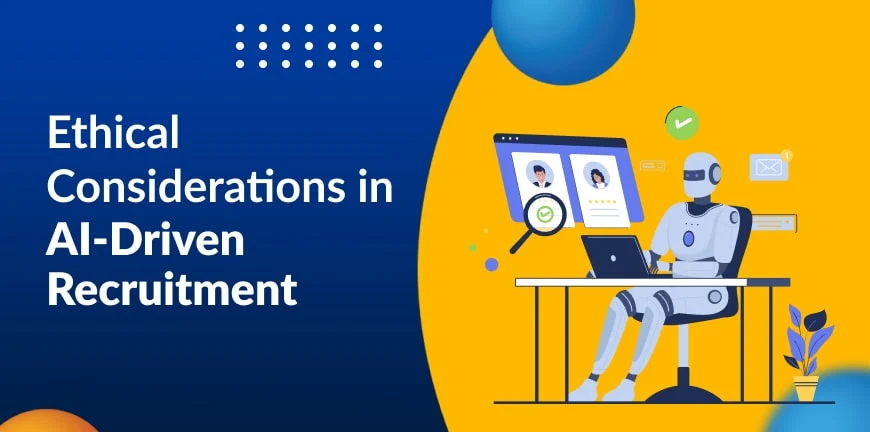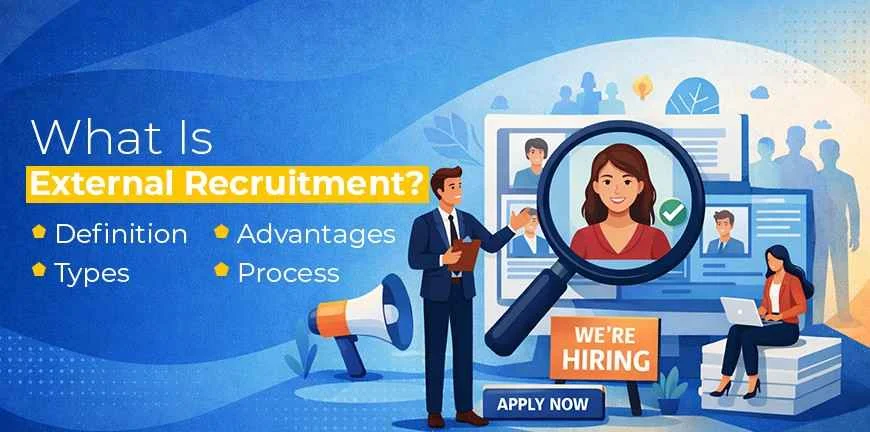
What is Employee Onboarding Process? Definition and Best Practices
14/04/2025
POSH Compliance Checklist
14/04/2025Every radiant spark of innovation brings with it the shadow of challenges. Artificial Intelligence (AI) as we all know has taken over and is redefining recruitment rules. From speedy resume screening to competent candidate assessments, AI-backed tools are driving companies to hire faster, smarter and more effectively.
But behind the smart and streamlined promises, there is a web of complex ethical challenges that linger. As algorithms step up to craft the future of work, the aspects of fairness, accountability and transparency hog the spotlight.
Can we blindly trust these digital gatekeepers? If we want to truly capitalize on the power of AI in recruitment, we must look beyond convenience and the comfort zone committing to do what is appropriate for candidates, companies and the future of recruitment itself.
1. Bias and Discrimination
AI systems typically learn from historical data which is a bank full of conscious or unconscious human biases instilled while making past decisions. These biases if not tackled intelligently can become ingrained into the algorithms leading to unfavourable outcomes.
Discrimination based on gender, race and age can become systemic and there will always be a fear of qualified and capable candidates getting unfairly excluded. This will result in a company’s reputation and legal standing being at stake due to non-compliance with equal employment opportunity laws.
To combat the challenge, organizations can use bias detection tools and conduct regular audits of AI systems. They must employ diverse training datasets accurately representing the target applicant pool. Along with it they should introduce a set of ethical AI guidelines involving cross-functional teams.
2. Transparency and Explainability
AI recruitment tools often make decisions based on complex computations that cannot be easily interpreted by humans. Candidates are frequently clueless about why they were rejected or selected which impairs their trust and accountability.
The implications can be unpleasant as a lack of transparency can make it difficult for applicants to comprehend or challenge decisions. During audits or legal scrutiny, organizations may have difficulties defending their hiring practices.
There are certain solutions available like companies can adopt Explainable AI (XAI) principles prioritizing clarity in decision-making. They can provide candidates with feedback and ensure AI-based decisions can be tracked and justified. Their documentation regarding how the AI model was trained and what data was used also has to be completely clear and transparent.
3. Data Privacy and Consent
AI recruitment tools are heavily dependent on vast data to function efficiently. These systems gather, process and analyze a wide spectrum of personal information ranging from traditional application matters like resumes and cover letters to dynamic data sources like social media activity, online behavior, video interview recordings, facial expressions, voice tone and even keystroke patterns.
The abundant data allows AI to make smart and distinctive assessments if a candidate is suitable or not. While it is an extremely innovative and fast way of assessment, it raises genuine ethical and legal concerns around privacy, informed consent, and data security.
A company should make candidates fully aware while obtaining any data and ensure explicit consent. The data usage should be strictly restricted to recruitment purposes and efforts should be made to minimize data collection to what is necessary. Robust data security protocols should be implemented adhering to relevant privacy regulations.
4. Human Control and Accountability
AI is heavily influencing or being used for hiring decisions, but who will take the onus if a mistake is made? There can be an issue of accountability gaps if too much responsibility or control is given to machines. The decisions finally taken will lack human oversight and empathy.
There is a chance of unfair practices going unchallenged and responsibilities getting diluted when third-party vendors are involved. The candidates might get demoralized with the entire process.
To confront these challenges, companies can involve humans when it comes to the final hiring decisions, and it can be reviewed by senior qualified recruiters or hiring managers. Clear accountability frameworks must be defined regarding AI system outcomes. Another useful way is to create mechanisms for grievances and appeals.
5. Candidate Experience Impact
AI has taken the recruitment landscape by storm and streamlined the processes like never before. However, it can also cause job seekers to feel frustrated as they may find the process to be impersonal and vague. It can be damaging to the brand image of the company if there is hardly any opportunity to interact with humans or overly used automation and rejection notices without any feedback. A poor candidate experience may dissuade top-notch talent from applying. Moreover, negative feedback spreads easily and it can reflect on public platforms like Glassdoor or LinkedIn leading to disrupting an organization’s reputation.
To integrate AI systems effectively yet not jeopardize the recruitment system, companies need to design AI systems that don’t replace human interaction but enhance it. Hiring managers and recruiters should provide candidates with timely and constructive feedback.
6. Procurement and Vendor Accountability
A lot of organizations are dependent on third-party vendors for AI recruitment solutions. It might happen that the vendors will not disclose the details about how their systems function and whether they meet ethical and legal standards.
Organizations may be unaware of it and might unintentionally use biased or non-compliant tools. However, the legal and ethical responsibility may still fall on the employer, not the vendor.
To avoid the repercussions, it becomes imperative for companies to conduct due diligence while selecting AI vendors entailing audits and certifications. They should be persistent and insist on transparency in the design and testing of AI systems. A clear contract should be drafted defining data ownership, compliance and liability.
7. Shaping Ethical AI Recruitment
AI-powered recruitment is reconstructing the way companies are hiring bringing to the table speed, efficiency and impactful data insights.
But underneath all that hype lies a critical truth which is, without a robust strong ethical backbone, these tools pose a risk of reinforcing bias, compromising privacy ravaging human touch from life-altering decisions.
Organizations must look beyond the promise to truly harness the power of AI by actively erasing out bias. They must be transparent about decision-making, protect candidate data and facilitate human intervention.
Ethical AI in hiring is not all about meeting compliance, it is about ensuring that technology reflects our value systems that include fairness, inclusion and respect for each individual. Ethical hiring is the way forward laying a foundation for a workplace where equality and respect thrive.
Contact Us For Business Enquiry

Amit Saproo
Amit Saproo is the Head of Operations at ALP Consulting with nearly 17 years of experience in Executive Search, RPO, Leadership, and IT & Engineering recruitment. He leads nationwide recruitment programs across Technology, BFSI, and R&D domains, driving strategic hiring solutions for diverse client needs. Amit excels in building and managing high-performance teams that deliver scalable, end-to-end recruitment and consulting services.



